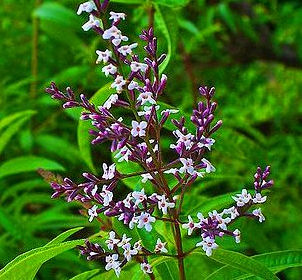| |
Lemon Verbena (Aloysia Citrodora)
 |
OTHER NAME(S): Aloysia citrodora, Aloysia triphylla, Cedrón, Herb Louisa, Hierba Luisa, Lemon-Scented Verbena, Lippia citrodora, Lippia triphylla, Louisa, Verbena Citrodora, Verbena triphylla, Verveine Citronnée, Verveine Citronnelle, Verveine des Indes, Verveine du Chili, Verveine du Pérou, Verveine Odorante, Zappania citrodora.
Aloysia citrodora is a species of flowering plant in the verbena family Verbenaceae, native to South America. Common names include lemon verbena and lemon beebrush. It was brought to Europe by the Spanish and the Portuguese in the 17th century and cultivated for its oil.
Lemon verbena is a perennial shrub or subshrub growing to 2–3 metres high. The 8 centimetres (3.1 in)-long, glossy, pointed leaves are slightly rough to the touch and emit a strong lemon scent when bruised (hence the Latin specific epithet citrodora—lemon-scented).
Sprays of tiny purple or white flowers appear in late spring or early summer, although potted lemon verbenas may not flower. It is evergreen in tropical locations,but is sensitive to cold, losing leaves at temperatures below 0 °C (32 °F), although the wood is hardy to −10 °C (14 °F). Pruning is recommended in spring to encourage a bushy form. Due to its many culinary uses, it is widely listed and marketed as a plant for the herb garden.
Lemon verbena leaves are used to add a lemon flavor to fish and poultry dishes, vegetable marinades, salad dressings, jams, puddings, Greek yogurt, and beverages. The leaves are also used in potpourri. Lemon verbena is used to make herbal teas and as a liqueur flavoring. It is used in traditional medicine in Latin-American countries. The oil was historically steam-distilled from the leaves for use in the perfume industry.
The major isolates in lemon verbena oil are citral (30–35%), nerol, and geraniol. Extracts of lemon verbena also contain verbascoside. As the plant has several phytochemicals which may act as substrates for drug-metabolizing enzymes, lemon verbena may cause herb-drug interactions. However, lemon verbena oil is generally recognized as safe when used as a flavoring.
The first European botanist who publicly noticed this plant was the French Philibert Commerson, who collected in Buenos Aires on his botanical circumnavigation with Bougainville, about 1767. The plant had already been imported directly into the Real Jardín Botánico de Madrid, where in 1797 professors Casimiro Gómez Ortega and Antonio Palau y Verdera [es] named it, though they did not yet effectively publish it, Aloysia citriodora in Latin and "Hierba de la Princesa" in Spanish, to compliment Maria Louisa of Parma, Princess of Asturias the wife of the Garden's patron Infante Carlos de Borbon, Prince of Asturias and son of king Carlos III. The name was later effectively published in the first volume of Palau's Parte Práctica de Botánica in 1784.
Unofficial importations from Spanish America seldom fared well: when another French botanist Joseph Dombey landed his collections at Cadiz in 1785, the plants were impounded and left to rot in warehouses, while Dombey was refused permission even to have seeds planted. Among the bare handful of plants Dombey had assembled during eight years at Lima, lemon verbena survived. Gómez Ortega sent seeds and specimens of the plant to Charles Louis L'Héritier de Brutelle in Paris; L'Héritier published it as Verbena triphylla in his Stirpes Novae, published in December 1785 or January 1786. From Paris John Sibthorp, professor of Botany at Oxford, obtained the specimen that he introduced to British horticulture: by 1797 lemon verbena was common in greenhouses around London, and its popularity as essential in a fragrant bouquet increased through the following century.
This plant has gained the Royal Horticultural Society's Award of Garden Merit.
The leaves and the flowering tops are used to make medicine.
Lemon verbena is used for digestive disorders including indigestion, gas, colic, diarrhea, and constipation. It is also used for agitation, joint pain, trouble sleeping (insomnia), asthma, colds, fever, hemorrhoids, varicose veins, skin conditions, and chills.
In foods and manufacturing, lemon verbena is used as an ingredient in herbal teas, as a fragrance in perfumes, and as an ingredient in alcoholic beverages.
Lemon verbena contains a substance that might kill mites and bacteria.
Lemon Verbena has gained popularity in recent years. Although it is native to South America, the rest of the world quickly caught on this superfood trend. The plant became accessible to everyone, which is great because of the many benefits that it has. It is a powerful medicinal ingredient as well as an effective additive to skin care products.
Lemon verbena can be extracted and its essential oil can be harvested. It has a high concentration of strong antioxidant compounds, like citral, nerol, verbascoside, and geraniol. Most often, lemon verbena is used as pill supplements or herbal teas. The leaves are dried and steeped to create a tea that gives a nice boost to metabolic processes and organs. More recently, the benefits of the plant to skin care have been discovered.
We now know how much the therapeutic properties of lemon verbena are valued. It can help to relax and tone the skin. This is why it is often used as a soap.
Lemon verbena is safe for all skin types. You end up with a toned, yet soft and supple skin. In the soap, you’ll find lemon verbena essential oil, which is very gentle and helps regulate the level of natural oils in the skin. If you’re suffering from uneven skin tone, you may benefit from it.
One of the biggest problems people worry about is the premature aging of the skin, thanks to pollution and the many chemicals we’re exposed to. Lemon verbena soap can combat this problem by firming the skin. It gives a youthful freshness which you can’t get from non-natural soaps. It has antioxidants that inhibit premature skin aging.
As mentioned, we’re constantly exposed to harmful chemicals, pollutants, and bacteria. These cause pimples, acne, and other skin problems. It can also act as an astringent to fight off blemishes and treat scars.
The oils of the plant give you a not only clean skin but one that is nourished as well. The skin becomes smooth and uplifted after each wash. Because of the natural flavonoids, you experience a very bright and radiant skin.
Lemon verbena has properties that can be compared to green tea. It is full of anti-inflammatory properties, which can reduce skin redness and irritation. If you have puffy skin, this is ideal for you. You get a soothing, cooling feeling.
This plant is able to get rid of dirt, pollutants, and excess oil (sebum) in the skin, which can cause acne and major skin issues. Even though it effectively removes bacteria, it does not cause excessive drying. You end up with blemish-free, healthy-looking skin.
After a hard workout, you can also benefit from using lemon verbena soap. It has properties that regulate oxidative damage and helps in relieving sore muscles after exercising.
The soap contains lemon balm oil, which is rich in natural viricides and hydrosol, that is effective in treating some skin conditions and cold sores.
Not only is this soap great for your skin, but it’s also very naturally fragrant. It’s like having a natural perfume on. This is why lemon verbena is often used in making potpourri, too. Leave a soap opened in the bathroom and it’ll smell nice all day long.
It’s not surprising that lemon verbena soaps are used in massage centers, salons, and spas. They use it as a skin cleanser. Its antiviral and antioxidant properties remove excess oils while keeping the moisture in the skin.
Disclaimer: The information presented herein is intended for educational purposes only. These statements have not been evaluated by the FDA and are not intended to diagnose, cure, treat or prevent disease. Individual results may vary, and before using any supplements, it is always advisable to consult with your own health care provider.
|
|


















